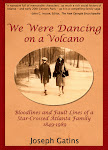
What might a young, international playboy and sportsman with plenty of money do for fun in his free time in the advent to World War I? Well, why not head to Paris for a party like so many others? Thus did my grandfather Joseph F. Gatins Jr. become part of the crowd of Americans descending on the French capital during the summer of 1914. He was a young real estate investor and horseman from Atlanta and New York, a well-traveled and well-heeled 32-year-old international sportsman and aficionado of French history, and a member of that class of idle rich spawned from America’s Gilded Age, largely living off of his father’s considerable fortune, well- traveled in Europe and the Far East, and still an eligible bachelor.
As things were done in that era, he was properly introduced to a lovely and intelligent French girl 10 years his junior, Eglé Marie de Villelume-Sombreuil, my grandmother, who had enough experience and savoir-faire to speak passable English. They were attracted to each other. “He was the handsomest man I had ever met,” Eglé recalled many years later. “He was very handsome. He was short, nice-looking. He was very intelligent, very well read and had studied in England. I met him at a big party at the Ritz. And very quickly, we were engaged. He pleased me very much. He had beautiful blue eyes,” Eglé recalled. But she also felt sorry for her fiancé. “He had lost one arm,” Eglé said. “That was probably one of the reasons I married him. I felt sorry for him.”
I discovered two versions of how my grandfather lost his right arm. The first had him taking a tumble while running on a set of stairs as a youth of 16 and losing his arm from that accident. The second, which seems more plausible, would have had him receiving a smallpox vaccination before his arm was set in a cast, and the vaccination spot becoming so infected underneath the cast that it necessitated amputation.
His recollection of meeting Eglé is not recorded for posterity but the available record suggests clearly that he was very much intrigued by Eglé and her connections to a rich French history. As early as July 1914, he’d sent a cable to Atlanta to announce his intentions, which were duly recorded in a brief article in The Atlanta Constitution of July 10. “Joseph Gatins, Jr., wins bride in Paris,” the headline said. The article went on to relate that Gatins Jr., “one of the most prominent young men socially and otherwise” in Atlanta, was soon to wed Eglé, daughter of the countess de Sombreuil of Paris, “one of the most aristocratic of French families.”
A post-wedding headline was, “Marriage of Mr. Joseph Gatins and Comtesse de Sombreuil in Paris,” marking the beginning of a long newspaper love affair with the Gatins family, which apparently fascinated Atlanta society and its society columnists.





No comments:
Post a Comment